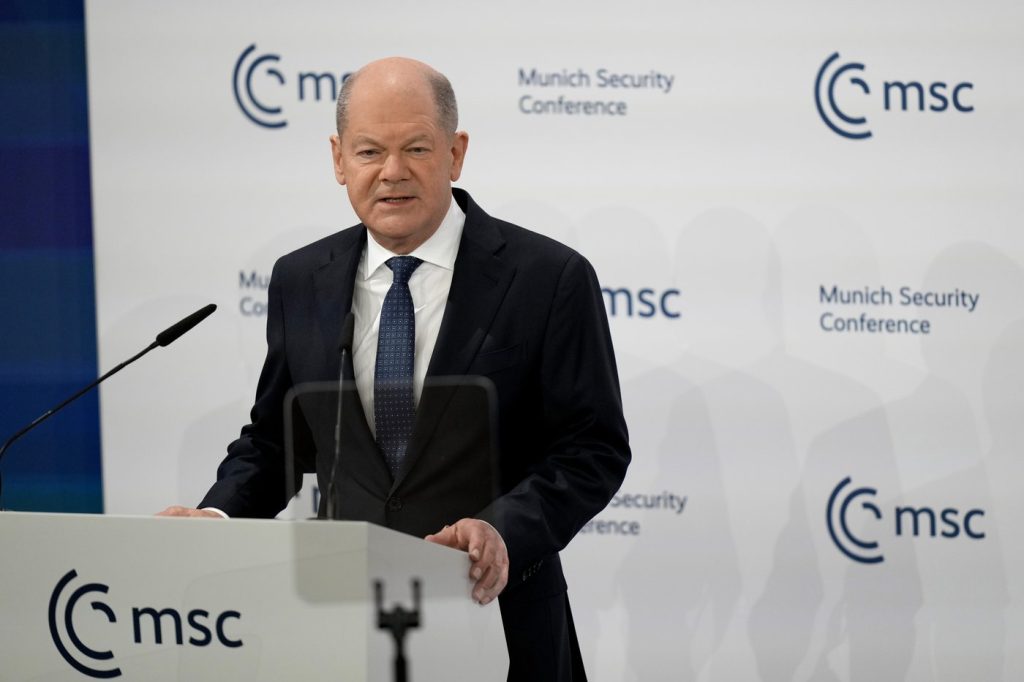MUNICH (AP) — At the Munich Security Conference, Ukrainian President Volodymyr Zelenskyy emphasized the urgent need for the establishment of an "armed forces of Europe," arguing that Ukraine's ongoing conflict with Russia has demonstrated a solid foundation for such a military force. Zelenskyy articulated concerns that European nations cannot rely solely on the United States, highlighting the potential for an “American might” response that may not align with European interests. He expressed strong conviction that the time is ripe for the creation of a cohesive European military force.
In a parallel address, German Chancellor Olaf Scholz defended his position against the far-right political party Alternative for Germany (AfD). He rebuked U.S. Vice President JD Vance's remarks criticizing the state of democracy in Europe, insisting that Germany will not tolerate any external interference in its democratic processes. Scholz spoke in the context of critical elections approaching in Germany, where the AfD currently holds second place in polls, ahead of Scholz's Social Democrats.
Despite escalating tensions regarding domestic politics, Scholz applauded the shared commitment between Germany and the United States to safeguarding Ukraine's sovereignty, echoing sentiments previously made by U.S. President Donald Trump about the necessity of bringing an end to Russia's war in Ukraine. However, Scholz did not shy away from mentioning Germany's historical ties to Nazism, emphasizing a national commitment to never allow a resurgence of far-right ideologies, which he deemed incompatible with support for the AfD.
Scholz firmly rejected foreign intervention in Germany's democratic affairs, stating, “Where our democracy goes from here is for us to decide.” The chancellor’s comments were made in response to Vance's assertions that free speech in Europe is under threat and that many voices in the American political sphere perceive efforts in Europe to limit such speech as politically motivated attacks against differing viewpoints.
The discussions highlighted an ongoing struggle for European leaders as they navigate a shifting political landscape under the Trump administration. Scholz pointed out that free speech in Europe must be conducted within the laws and regulations established in individual countries, referring specifically to Germany's restrictions on hate speech.
U.S. Vice President JD Vance, who met with AfD co-leader Alice Weidel on the sidelines of the conference, reiterated his concerns regarding alleged erosion of fundamental values within Europe. He stated, “The threat that I worry the most about vis-à-vis Europe is not Russia. It’s not China. It’s not any other external actor. What I worry about is the threat from within — the retreat of Europe from some of its most fundamental values, values shared with the United States of America.”
Following a 40-minute discussion with Zelenskyy, Vance conveyed the Trump administration's desire to see the conflict in Ukraine resolved. Vance's remarks were framed against the backdrop of Trump’s recent phone call with Russian President Vladimir Putin, in which the two leaders discussed plans for potentially negotiating a peace deal. Zelenskyy has made it clear that his government seeks security guarantees before engaging in any formal dialogue with Russia.
The Munich Security Conference drew various global leaders, including NATO chief Mark Rutte and foreign ministers from Canada, France, Germany, Saudi Arabia, and Syria's interim government. Discussions at the conference underscore the complex dynamics surrounding democracy, security, and the ongoing war in Ukraine, reflecting the challenges European leaders face while striving to maintain democratic integrity and sovereignty amidst evolving external pressures.










